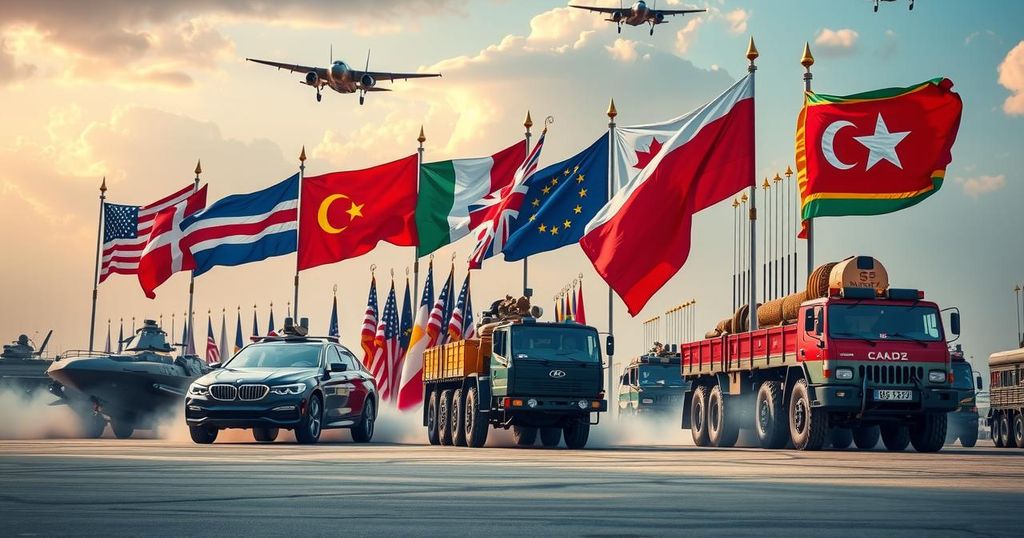Europe’s Leaders Unaware of Autocratic Alliance’s Growing Threat

European leaders seem oblivious to the rising alliance of autocrats, as exemplified by events in Moscow and the London Defence Conference. This alliance, comprising Russia, China, Iran, and North Korea, represents a significant geopolitical threat. Despite growing military capabilities, complacency among European leaders persists, warranting urgent reevaluation of defense strategies and alliances.
In a recent display of unity, Russia commemorated the end of World War II with an event attended by a motley crew of autocrats in Moscow. President Vladimir Putin, marking the event surrounded by leaders from Belarus, Venezuela, Cuba, and other regimes, highlighted a troubling trend for democracies. Notably, he was flanked by Chinese President Xi Jinping, signaling the growing dependency of Russia on its authoritarian allies amidst the ongoing conflict in Ukraine.
As the world witnessed this gathering, the theme at the concurrent London Defence Conference emphasized an emergent alliance of autocrats including China, Russia, Iran, and North Korea—identified as the ‘Crinks’—posing a significant geopolitical threat to democratic nations. The extent of this alliance and its ramifications seems either unacknowledged or underestimated by European leaders, who remain surprisingly passive against this rising tide of tyrannical power.
The military collaboration among these nations is already evident. Reports indicate that Iran has supplied Russia with drones, critical in its assaults on Ukraine, while allegedly assisting in establishing a drone factory with the potential for 6,000 drones annually. Furthermore, North Korea has reportedly provided 20,000 containers filled with artillery and ammunitions amid cooperation in military operations that featured North Korean troops aiding Russian forces.
While North Korea took notable steps in aid to Russia, China’s role has been less overt in terms of lethal weapon supplies, but its contribution is far-reaching. China is responsible for over 70% of machinery tools and 90% of microchips fueling Russia’s defense revival. Joint military exercises, such as ones conducted in the Gulf of Oman, also underscore their strategic cooperation, as China continues to bolster the Russian economy by purchasing substantial amounts of oil and gas.
The situation looks grim for Europe as Putin remains undeterred, ramping up Russian military capabilities significantly. There are predictions that Russian factories could produce 1,500 tanks and 250,000 shells per month, all while planning a fighting force totaling 1.5 million. This escalation is taken seriously by NATO, especially at a time when Western alliances appear vulnerable.
Europe’s comfort in the status quo is alarming, especially with waning confidence in the American commitment to democracy’s defense. The question looms whether Europe should rely on traditional alliances or forge new protective pacts without the longstanding American partnership. Complacency in political circles across key European states reflects a concerning disconnect regarding the urgent need for military preparedness.
Leaders like French President Emmanuel Macron and Germany’s Chancellor Friedrich Merz have yet to display clear resolve in rearming efforts. Meanwhile, nations closer to the front lines, such as Poland and the Baltic states, seem to grasp the gravity of the situation far better. In the UK, Labour leader Keir Starmer’s recent remarks at the London Defence Conference illustrated inadequate recognition of the necessary defense spending required at such a precarious moment in history.
Starmer’s plans to increase defense spending merely signify a token gesture against the substantial needs articulated by experts; the ambition lacks clarity and depth. This disconnection with reality underscores an urgent need to reevaluate NATO among European nations, considering less reliance on American support is prudent.
Britain, the military powerhouse of Europe, could spearhead initiatives for creating a coalition that addresses the collective security needs of major democracies. However, leading by example is crucial, necessitating a substantial commitment to defense spending rather than mere political rhetoric. This blending of sentiments calls for a rethinking of defense strategies in a world where complacency towards the autocratic alliance could be perilous.
The ongoing collaboration among autocrats poses a critical threat to European democracies, as highlighted by recent events in Moscow and the London Defence Conference. Leaders must recognize the urgency of reevaluating defense strategies and strengthening alliances without full reliance on American support. A unified approach among willing allies, with a sincere commitment to defense budgets and military readiness, is essential to counteract the growing menace posed by autocratic powers.
Original Source: www.dailymail.co.uk








